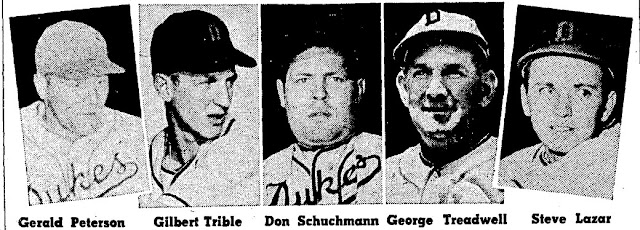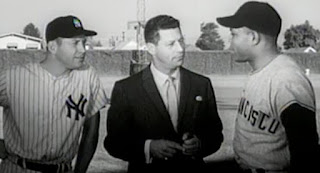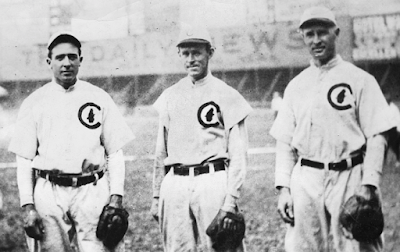Duluth Dukes Bus Accident
 |
| The five Duluth Dukes who passed away in a bus accident. |
On this date in 1948 The Duluth Dukes team bus collided with a truck traveling the other way resulting in the death of six people. The loss was felt by all levels of the baseball community who tried to help the team come back from the catastrophe.
The Dukes were in third place trying to catch the Northern League leaders Grand Forks Chiefs. They had just finished playing a series of games in Eau Claire, Wisconsin with the Bears and were heading up to St. Cloud, Minnesota to start a series of games with the Rox that night. Manager George Treadwell was driving the team bus along West Highway 36 near Dale Street in Roseville, Minnesota. At the same time a truck from the Liquid Carbonic Corporation carrying dry ice was driving East on Highway 36. The truck driver, James Grelish, hit a bump in the road, possibly a pot hole, and lost control of the truck. Today Highway 36 is separated by a barrier, but in 1948 it was an open road. The truck crossed the center line and crashed into the team bus head on. The truck hit the bus with enough force that the bus tipped over on its side. The gas tank of the bus ignited and flames engulfed the bus. Because the bus was on its side, some of the players were trapped and unable able to escape.
 |
| The bus and the truck after the flames had been extinguished. |
The surviving members of the team were taken to Ancker Hospital and treated for injuries. Only three players were released from the hospital the next day with small bruises, Elmer Schoendient, brother of Red, Mel McGaha, and Ward. The number of players that were reported in critical condition varies between three and fourteen. Two, Bernard Gerl and Stepehn Lazer were among them. Lazer would pass away two days later from head injuries. Gerl does not remember anything about the accident, only waking up in the hospital a few days later. As the last living member of the 1948 Dukes team, Gerl has been the keeper of the flame as it is, but everything that he remembers about the accident has been told to him by other people. He arrived early to the bus that day because he wanted to get an aisle seat so he could stretch out his long legs. He found a seat three rows behind driver Treadwell. When teammate Gilbert Trible approached him and told Gerl to push over to the window, Gerl replied, “No. You can climb over me and have a window seat.” Along with Trible, the player sitting in front of and behind Gerl would not survive the crash.
Don Gilmore was another who was in critical condition at the hospital. He had a similar story to Gerl's about seating arrangements on the bus before departing. He said, "Schuchman had asked to switch seats on the bus so he could play cards. Had we not changed seats maybe he wouldn't have been killed."
With a large percentage of the players either dead or in the hospital and no manager to lead them, what does a team do? Sam Hunter, who had reported to the team two days before the crash but had not traveled with the team, was the only available player. The Dukes at the time were an affiliate team of the St. Louis Cardinals. The Cards sent executive George Sisler, Jr. to St. Paul to help rebuild the team. Walter Shannon, supervisor of the Cardinals minor league system was also sent in to help. The Cardinals shuffled players from their other minor league team to the Dukes to add ten players to the roster. Another ten players came from six of the seven other teams in the Northern League. St. Cloud, the team the Dukes were traveling to play, did not contribute any players. Even the Minneapolis Millers loaned a player to the Dukes. Lastly, Willard Anderson came off of the retired list to join the roster. Ted Madjeski, one of the players who came from another Cardinals minor league team, was named manager.
 |
| Sporting News Aug. 11, 1948 |
All through the minor leagues the tragedy was felt and money was raised to help with medical expenses and for the families of the dead. Herman D. White, president of the Northern League asked for contributions and many were generous in giving. Some of the early donations came from fans at a Macon Peaches game in Georgia. A collection was taken and $514.07 was raised. The Spokane Indians team, who had dealt with their own tragedy, also planned to make a large donation. Only two years earlier the Indians had lost nine members of their team when their bus slid off a cliff and fell 300 to 500 feet. The Texas League contributed another $2,000.
With a full roster pieced back together, the team was able to schedule some benefit games to raise more money. All across the country other minor league teams were also holding benefit games to raise money for the Dukes. One game took place in Duluth and raised $4,260.82 with another one held the next day in Superior that raised $1,242.82. The final tally from Herman White of donations reached $81,502 with $10,000 from the National and American Leagues, and $22,504 collected by the Duluth Junior Chamber of Commerce.
To honor manager Treadwell and the Dukes, the George Treadwell-Duluth Dukes Memorial award was created and awarded to the best rookie of the Northern League. Winners included Bill Bruton (1950), Hank Aaron (1953) both for the Eau Claire Bears, and Roger Maris (1953) for the Fargo-Morehead Twins.
Many of the players who were in the accident never played professional baseball again, or moved on to other minor league teams. Mel McGaha, who suffered minor injuries, was the lone member of the team who would reach the major leagues, but not as a player. He would manage the Cleveland Indians for half a season in 1962 and the Kansas City Athletics for parts of 1964 and 1965. His professional sports career would also spill over to basketball when he played 51 games for the New York Knicks in 1948-1949.
The players and the community of Duluth work hard to not forget the people who died in the bus accident. Starting with the 25th anniversary of the accident, the Duluth Dukes started a yearly tradition to honor the members of the 1948 team with a reunion. Every year Bernard Gerl made the pilgrimage from his home in Joliet, Illinois to see his old teammates and honor those who had passed away. Even as the last living member of the team, he made the annual trip to mark the occasion. In 2013 The Dukes had Gerl throw out the ceremonial first pitch. In 2016 the team held a Gerl bobble head night. However, in 2017, at age 90 Gerl was unable to make the trip because of health issues. It was the first time he had missed the reunion since it started in 1973.
 |
| Bernard Gerl in his Dukes uniform in 1952 and 2016. |



Comments
Post a Comment